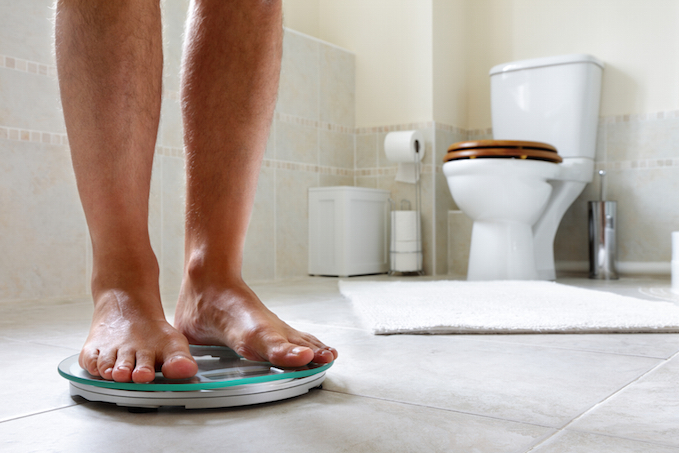How Whooshes Impact Your Weight Loss

At the most basic level, losing weight is all about creating a caloric deficit.
I’ve spoken about this many times – if you’re burning more calories than you are consuming, you WILL lose weight. This is simply a fact, and grounded in the first law of thermodynamics.
However, as many diligent dieters have personally discovered, the amount of weight that you lose each week isn’t always going to be consistent.
Some weeks, you’ll find that you don’t lose any weight at all – even when you’re maintaining the appropriate caloric deficit. The scale pretty much stays exactly the same.
Then the following week, you’ll suddenly lose a whole bunch of weight at once – in fact, much more than you would expect to lose in just one week.
But how could this be? You are eating the same number of calories, exercising the same amount – why is it that you would lose such staggeringly different amounts, week to week?
Well, the answer to this lies in something that has been fittingly dubbed “the whoosh”. Yes, you read that right!
And in this article, I am going to teach you exactly what whooshes are, and how they can drastically impact your scale weight week to week.
What Is The Whoosh?
If you’ve ever experienced the phenomenon I described above, then you’ve likely already experienced a whoosh, even if you didn’t realize it.
To my knowledge, the term ‘whoosh’ was first used by renowned nutritionist Lyle Mcdonald, in attempting to explain this strange occurrence.
Basically, as you diet down, you’ll often notice that your fat tends to take on a squishy consistency during certain periods (Lyle appropriately calls this ‘squishy fat’).
Then, when the whoosh occurs, all of that squishy fat suddenly tightens up. You immediately look a lot leaner, and your scale weight drops considerably.
Yes, if you were to put a sound to this sudden event, ‘whoosh’ would be pretty appropriate…
Why Does It Happen?
The most likely reason for this stop and start pattern of fat loss actually has to do with water retention.
When you are maintaining a caloric deficit, your fat cells are emptied of triglyceride as your body breaks it down for energy. However, as this happens, the fat cells end up temporarily filling back up again with water.
In effect, this means that the fat cells do not immediately shrink. There is also no immediate decrease in body weight, due to water uptake offsetting the actual fat that was burned.
Then, after a period of time, the fat cells will suddenly flush all of the water that they’re holding and finally shrink down. This is the whoosh taking place.
So, in reality, you have actually been consistently burning fat the entire time, but it will only become obvious after these whooshes, since that is when your scale weight drops and everything tightens up.
How To Avoid The Whoosh
The short answer is that you can’t!
I know, it would be less frustrating if your scale weight just decreased in a completely linear pattern, week to week, but it just doesn’t work like that.
However, if you are looking to reduce the amount that you experience these sudden drops – thus smoothing out the process of losing weight – then you will want to decrease your water retention in general.
It has been demonstrated that people with higher levels of water retention experience more extreme whooshes. Therefore, it follows that if you reduce your water retention, you have a good chance at reducing the severity of each whoosh.
The topic of water retention is beyond the scope of this article, but I will be following up with an article on that next week which I’ll link to then.
That being said, there is one simple thing that you can do to encourage the whoosh: you should have a large, carb-heavy meal.
Yes, there is something about intermittent refeeds during periods of dieting that can cause whooshes to take place.
The specific reason why this works isn’t completely understood, but from my own experience and that of my clients it does indeed seem to work.
Anecdotally, alcohol has also been known to trigger whooshes, not that I would recommend that as a strategy…
Most importantly, though, try not to stress too much about the whole thing.
This is just the natural pattern that fat loss tends to follow – so you can now take comfort in the knowledge that you have actually burned the fat, and that you’re just waiting for your scale weight to catch up.